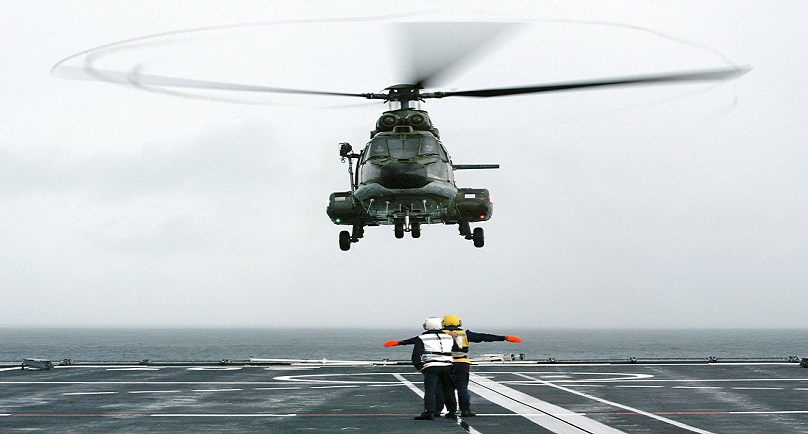Image: A Republic of Singapore Air Force Super Puma helicopter lands on the Singapore warship RSS Endurance during a search and rescue operation in the Singapore Strait, about 30 km (19 miles) east of the city state, on January 6, 2003. REUTERS/Jonathan Drake/File Photo
![]()
By Siva Govindasamy
SINGAPORE (Reuters) – Singapore will soon pick the winner of a $1 billion (687 million pound) tender for military utility helicopters, the first of several lucrative deals the island nation is pursuing as it modernises its air force and navy amid rising tensions in the region.
With Southeast Asia’s largest defence budget, Singapore is a key prize for global arms companies as it looks to invest in new technology and replace ageing equipment.
China’s increasingly assertive actions in the South China Sea, which are worrying Southeast Asian countries, are partly a factor, say analysts, given that these have led to Singapore’s neighbours spending more on their militaries.
Modern military technology also helps Singapore to keep its edge and compensates for its small size and population, said Richard Bitzinger, a regional security expert at the S.Rajaratnam School of International Studies in Singapore.
Data from IHS, a consultancy, estimates Singapore’s annual defence budget will hit $10.72 billion in 2020, up from $9.08 billion in 2015 and about $8.23 billion in 2011.
The most immediate decision for Singapore is to replace its Super Puma helicopters, which are made by European aerospace giant Airbus. Singapore is seeking around a dozen multi-mission aircraft to deploy off ships and on land.
Airbus and the helicopter division of Finmeccanica have been shortlisted and are in final discussions before a decision is made, said sources familiar with the details of the procurement. A decision will be made “soon”, defence minister Ng Eng Hen said in April.
Airbus declined comment and Finmeccanica did not respond to questions.
HARDWARE SPREE
The city state is also studying tactical lift helicopters to replace its Boeing Chinooks, transport-cargo planes to replace its ageing Lockheed Martin C-130s, and maritime patrol aircraft to replace its Fokker 50s, say several sources familiar with the country’s requirements.
Singapore could also order the Lockheed F-35 Joint Strike Fighter by the end of the decade and is studying Joint Multi Mission Ships that can carry several aircraft, add the sources, who did not want to be identified due to the sensitivity of the matter. Multiple unmanned platforms for airborne surveillance, are also under consideration.
Last December, Singapore confirmed upgrades worth more than $900 million for its Lockheed F-16 fighters. In the coming years, it will also receive new submarines manufactured by Germany’s ThyssenKrupp, Airbus A330 air-to-air refuelling tankers, and Littoral Mission Vessels (LMVs) to replace its patrol vessels.
Singapore’s defence ministry referred all questions on the country’s upcoming procurements and policies to its minister’s speech during a budget debate in Parliament.
“Rising nationalism and improving economies have fuelled many Asian countries to spend larger and larger sums to modernise their militaries,” Minister Ng said during the speech in April. “So as you look around at our security challenges, this troubled peace around us reaffirms our policy on steady and prudent defence spending.”
The next decision for Singapore after replacing its Super Puma helicopters could be on the Joint Multi Mission Ship – in effect a helicopter and tactical aircraft carrier.
These will eventually replace Singapore’s Endurance-class support ships, and can be used for disaster relief in the region – something Singapore has regularly undertaken – and potentially allow the land-scarce country to deploy air assets beyond its shores.
ST Marine, a unit of state-owned Singapore Technologies Engineering, displayed a model of such a ship at a defence exhibition in 2014.
The company told Reuters that it has completed “conceptual and functional design” on the vessel.
“This would put us in a good position to be able to respond swiftly in the event of a RFP (request for proposals), when it comes,” said a ST Marine spokeswoman in an emailed response.
International defence contractors including Boeing, Lockheed Martin, and Airbus are also expected to be vying for various other modern requirements such as transport planes, maritime patrol aircraft, and fighter jets.
Airbus Helicopters, Boeing and Lockheed referred all questions about future procurements to the Singapore government.
Defence firms are generally reluctant to discuss potential deals with Singapore.
“Everything concerning Singapore’s defence is sensitive. Leaking any information will lead to the company losing the contract,” said one retired employee of a major defence contractor.
Singapore, however, does its research, rarely changes its mind and pays promptly, making it is a highly valued customer for defence companies.
“Singapore is pretty desirable for every defence contractor,” Bitzinger, the security expert, said. “The value of winning a contract from Singapore goes beyond the dollars and cents. It is an affirmation of the product and the company.”
(Editing by Lincoln Feast)
Copyright 2015 Thomson Reuters. Click for Restrictions.


